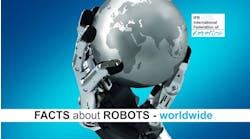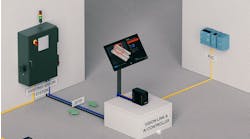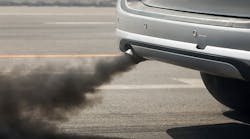The titans of Detroit’s auto industry met with President Donald Trump four days after he took office and warned that jobs could be lost if the emission limits enacted by his predecessor weren’t made more flexible.
On Monday, the Trump administration responded by agreeing to revise the Obama administration standards -- but in a way that may backfire on the automakers.
In announcing the decision, Environmental Protection Agency Administrator Scott Pruitt included a tacit threat that the federal government might no longer go along with California’s smog-fighting policies. That could lead to pollution rules that vary state-by-state, greatly complicating life for the people making the cars.
“Automakers will get the flexibility they wished for, but at what cost?" said Jessica Caldwell, executive director of industry analysis at the car shopping website Edmunds. "The unfortunate reality is that this decision comes with a logistical nightmare in the short term."
After the EPA said that fuel-efficiency regulations for cars and light trucks were too stringent and Pruitt singled out California, officials of that state promptly vowed to defend its standards in court, signaling that years of litigation and uncertainty could lie ahead, further complicating an industry already facing profound change from self-driving cars and mobility services.
If the industry winds up with a patchwork of rules, "it’s going to be a nightmare in California," Jim Lentz, chief executive of Toyota Motor Corp. in North America, said in an interview last week. "You may have people cross the border to buy a truck in Nevada and not in California," he said.
At the same time, Lentz said, automakers can’t accept regulatory targets that force them to build cars customers don’t want.
But for the Trump administration, this isn’t solely about what automakers want. Trump’s agencies have been methodically tearing up many of the signature policies of former President Barack Obama. Nowhere is that more true than with environmental rules, which represent the front line of Trump’s vow to lift regulatory burdens that he says throttle economic development.
The EPA’s move to pare Obama-era vehicle standards dovetails with other Trump efforts to roll back Obama policies combating climate change, including the Clean Power Plan that slashed greenhouse gas emissions at power plants and regulations governing methane leaks at oil wells. Easing requirements meant to save fuel also align with Trump’s celebration of U.S. oil production and American "energy dominance."
Pruitt said the agency would work with California and other states. However, he said the agency was re-examining the Clean Air Act waiver that has given California unique authority to set its own clean-air rules since 1970, and that Sacramento wouldn’t set auto efficiency rules for the nation.
“Cooperative federalism doesn’t mean that one state can dictate standards for the rest of the country," Pruitt said in the agency’s press release. "EPA will set a national standard for greenhouse gas emissions that allows auto manufacturers to make cars that people both want and can afford -- while still expanding environmental and safety benefits of newer cars."
Twelve other states follow California’s emission rules, together accounting for about a third of the American automobile market.
The EPA will now begin drafting fresh auto standards for 2022-2025 alongside the National Highway Traffic Safety Administration, which has been developing new fuel economy targets for the same period. The new rules will be adjusted from current levels "as appropriate," Pruitt said.
Sacramento Versus Washington
California officials vowed to resist a Trump-led rollback of the federal targets, with state Attorney General Xavier Becerra threatening a lawsuit and Air Resources Board Chairman Mary Nichols blasting the EPA’s move as a bid to "demolish the nation’s clean car program."
"California will not weaken its nationally accepted clean car standards, and automakers will continue to meet those higher standards, bringing better gas mileage and less pollution for everyone," Nichols said in an emailed statement. "This decision takes the U.S. auto industry backward, and we will vigorously defend the existing clean vehicle standards and fight to preserve one national clean vehicle program."
Automakers and their trade associations applauded Pruitt’s decision but stressed the need to preserve a single set of aligned standards nationwide.
"Our priorities for modernizing the standards are the need for one national set of requirements and the need to comprehend new technology developments and increased shared and autonomous electric vehicles," General Motors Co. said in a statement. "We look forward to working with all parties on modernized standards that achieve better fuel economy for our customers and a better environment for everyone."
As the Trump administration begins rewriting the industry’s critical rules, automakers may not be in the driver’s seat. Instead, that role may go to influential free-market conservatives who for years have chafed at the federal government’s deference to California.
"Decisions about what kinds of cars people buy and drive should be made by the consumers themselves, not bureaucrats in Sacramento," said Thomas Pyle, president of the American Energy Alliance, a Washington advocacy group.
In a letter to Pruitt and Transportation Secretary Elaine Chao on Monday, Pyle and 11 other conservative leaders argued that the administration should use its rewrite of the emissions rules to "restore the program to its original legal regime as laid out by Congress."
That could mean a single set of federal requirements dictated by the National Highway Traffic Safety Administration -- without separate emissions standards from the EPA and the California Air Resources Board.
Detroit’s Dilemma
"It is arguable that the EPA" and California "programs should not exist at all, as the EPA program is duplicative" of the federal corporate average fuel economy standards, and the California program "is preempted under federal law, which was ignored by the previous administration," wrote the conservatives, including Myron Ebell of the Competitive Enterprise Institute and Grover Norquist of Americans for Tax Reform.
In most public comments over the past few weeks, automakers have tried to thread a rhetorical needle: advocating to ease the standards but imploring the Trump administration not to push so hard that California balks. Executives at Ford Motor Co. and Honda Motor Co. all said they want more flexibility in the rules but not a rollback in overall stringency, with Ford brass writing "we support increasing clean car standards through 2025 and are not asking for a rollback."
Ford might not want a rollback, but the company may get one in large measure because of pressure brought to bear on Trump last year. In March 2017, at a California Air Resources Board meeting in Sacramento, Nichols issued a warning for the industry about what might come next.
“I want to turn to the industry representatives who are here and say, ‘what were you thinking when you threw yourselves on the mercy of the Trump administration to solve your problems?’’’ Nichols said.
by Ryan Beene, Jennifer A. Dlouhy and John Lippert










